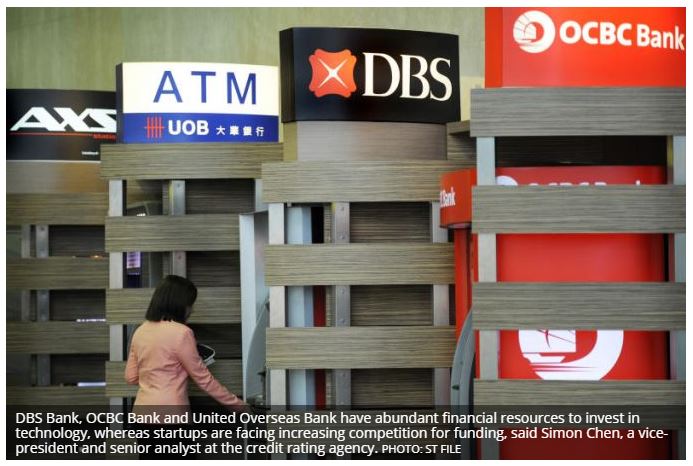Singapore’s 3 big banks can defend market share against fintech threats: Moody’s
THE three largest banks by assets in Singapore will be able to defend their market share against fintech competitors, despite the rapidly growing threats to their bank business from these companies, Moody’s Investors Service said in a report on Monday.
This is partly because DBS Bank, OCBC Bank and United Overseas Bank (UOB) have abundant financial resources to invest in technology, whereas startups are facing increasing competition for funding, said Simon Chen, a vice-president and senior analyst at the credit rating agency.
Moody’s noted in its report that fewer fintech companies received funding in 2018 than in previous years.
Moreover, even though the Singapore authorities are highly supportive of fintech innovation, they still restrict fintech firms from expanding into deposit-taking and lending so as to preserve financial stability, Mr Chen said.
While startups, mainly in the payments segment, have begun to gain traction with products such as GrabPay, their ability to disrupt the financial services sector in Singapore is also constrained by a high degree of banking penetration in the county and the three large banks’ strong franchises.
As a result, fintech companies are increasingly opting to collaborate with banks to jointly develop products, instead of competing with them for market share, Moody’s said. For banks, such partnerships also enable them to streamline their internal processes.
Equipped with vast financial resources, banks have been expanding their payment services in South-east Asia.
Their continued investments in digital transformation will enable them to defend their competitiveness, Moody’s said.
All three banks have led digitisation efforts in South-east Asia.
They “have been channelling cost savings from efficiency gains through digitalisation back into technology investments”, Mr Chen said.
Such digitalisation efforts have helped the banks improve efficiency, because technology significantly lowers costs for acquiring customers and processing transactions. Digital customers are also more profitable than traditional branch users, because they generate more revenue as a result of closer engagement with their banks.
Moody’s said fintech companies are attracted by Singapore’s developed financial infrastructure and policy framework, and the gateway it provides into the South-east Asian region.
The number of fintech ventures in Singapore increased by around 60 per cent to 756 at the end of October 2018, up from 479 at end-2017, Moody’s noted in its report.
The industry is also becoming more diverse. Prior to 2017, fintech investments in South-east Asia were primarily for digital payments and mobile wallets. But as the payments market matures, new fintech investments are increasingly flowing into emerging areas such as blockchain, online lending platforms, investment technology, robo advisory and artificial intelligence.
Particularly, more than one-third of fintech funding in Singapore last year was for technology development related to financing for SMEs (small and medium enterprises) and wealth management services.
DBS shares were trading down one Singapore cent at S$24.80 as at 1.32pm on Monday, while UOB rose 27 cents to S$25.26 and OCBC gained 11 cents to S$10.89.
Source: https://www.businesstimes.com.sg/companies-markets/singapores-3-big-banks-can-defend-market-share-against-fintech-threats-moodys


 English
English




